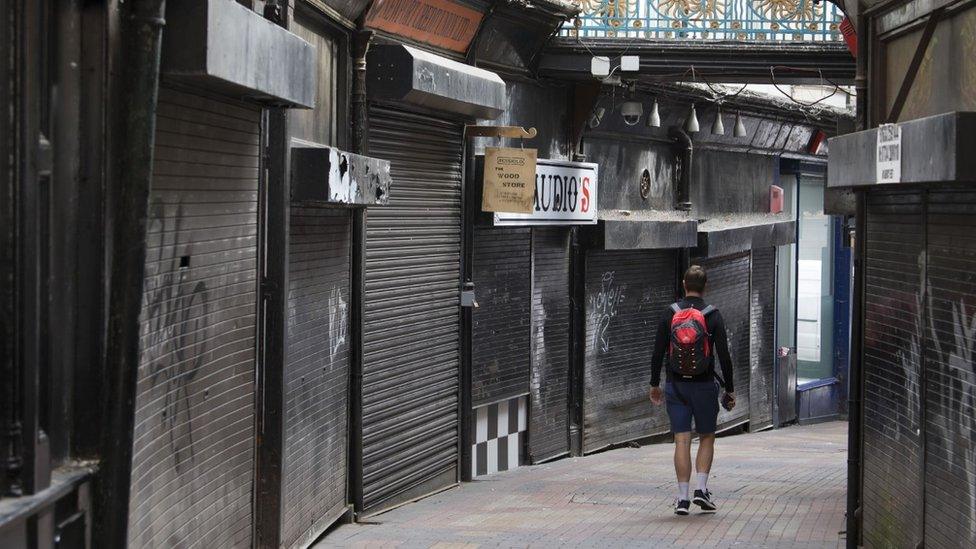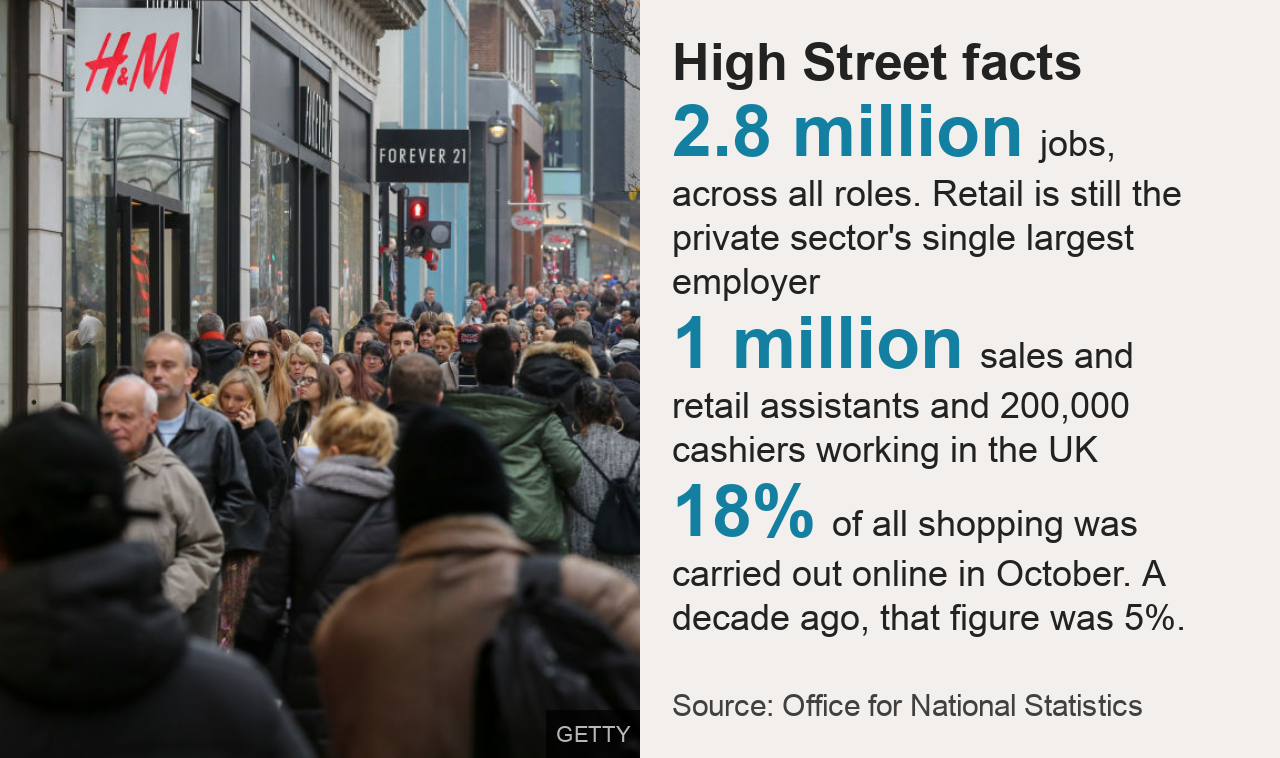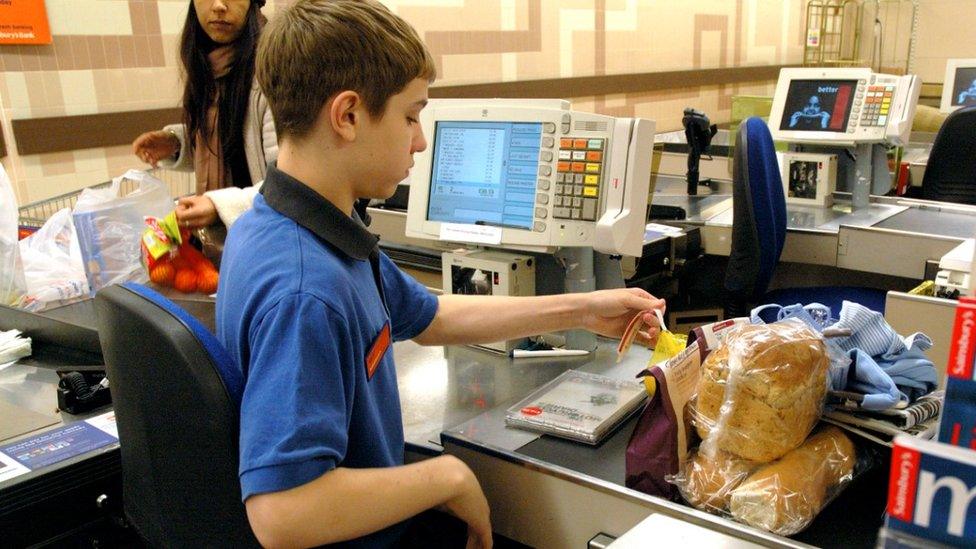'I've been made redundant five times'
- Published
- comments
John Brailsford has been made redundant five times
John Brailsford lost his job at Carpetright, in Wigan, after the chain decided to close nearly a quarter of its 400 shops.
It was his fifth redundancy in a 40-year retail career, which has meant he's often had to take a demotion to find another job.
He's one of an estimated 40,000 people who have been affected this year by upheaval on the High Street, according to BBC Radio 5 live's Wake Up To Money, which has been tracking the raft of business failures and shop closures since January.
'Update CV'
"The first time it happened was an absolute disaster and I just learned to take a step back, find myself another job, and carry on. Since then I've been made redundant four more times," said Mr Brailsford.
"The very first thought [with Cartpetright] was, here we go again. It came completely out of the blue. Having been through it so many times before it was just a case of - CV, update it, get it out there and see what happens."
'Politicians should do more to save our High Streets'
Is the shopping centre ready to check out?
High Street crisis: How do we spend our money?
Mr Brailsford has since found another job with the furniture retailer Abitare. But a Lancaster University study of official labour market statistics found two-thirds of redundant retail workers went on to work in other sectors, such as hospitality and manufacturing.
The high-profile demise of big names such as Maplin, Toys R Us and Poundworld has been followed by a string of store closures at High Street stalwarts such as Marks & Spencer, Carphone Warehouse and New Look.
Sluggish sales, online competition, and rising costs have been blamed for the changing landscape.

Bricks and mortar shopping has come under pressure from online outlets
Nearly 20,000 jobs have been lost so far, and a further 4,000 redundancies are expected in the coming months through planned closures at the likes of Homebase and Evans Cycles.
A further 16,000 jobs are under threat at House of Fraser and Debenhams. House of Fraser went into administration in August with 6,000 employees and 10,000 concession staff. It was bought by Sports Direct which said it wants to keep 47 of the 59 stores open.
It is currently negotiating new terms with store landlords, and so far about 20 have been saved, protecting 4,000 jobs, while 11 are closing.
Meanwhile, Debenhams wants to close 50 stores in the coming years, putting 4,000 jobs at risk.


'Huge part of the economy'
Paddy Lillis, general secretary of shopworkers' union Usdaw, said: "The biggest issue for workers is job security. We have a change in shopping habits, we're seeing more online versus bricks and mortar - as we call traditional town centres - and that's difficult.
"We've been calling for some time for a strategy for the politicians, employers and communities to look in more detail at what we can do to secure the High Street, look at the changing habits in retail, but also get this message across: retail is a real job, there are nearly three million employees in the UK.

The government unveiled an official plan to save UK retailing
"It's a huge piece of the economy," Mr Lillis said.
The government unveiled an official plan for the High Street in the October Budget.
It included business rates relief for half a million small retailers, £675m to help pay for improvements, and a consultation on planning reform to make it simpler to turn empty buildings into homes.
As well as all the shop closures, there's also been a shake-out in the casual-dining sector with Prezzo, Jamie's Italian, and Byron all closing restaurants. In total nearly 2,000 shops and restaurants run by major chains have either shut or are at risk of closure.



To put that into context, a broader study across 3,000 locations by the Local Data Company found there were 24,200 closures in the first half of the year - up 17% - and 19,800 openings, leading to a net loss of 4,400.
The upheaval on the High Street has filtered through to the jobs market with fewer vacancies for permanent traditional retail jobs, such as cashiers and shop managers, compared to other sectors.
'Transferable skills'
That's according to the Recruitment and Employment Confederation's (REC) monthly jobs report, which suggests demand for these jobs was lower than in other professions for 10 of the last 12 months.
The picture is slightly brighter for temporary staff, although demand was lower than in any other sector in seven of the last 12 months.

Retail workers may want to think about how they could transfer to other sectors
Sophie Wingfield, REC head of policy, said: "With stores closing or downsizing, and online retail filling the gaps in market, there simply aren't many traditional retail jobs available, either for permanent or temporary staff.
"However, with demand for staff high in other areas such as IT and hospitality, retail workers may want to think about how their skills could transfer to other areas."
- Published3 December 2018

- Published2 December 2018

- Published30 November 2018

- Published29 September 2018
